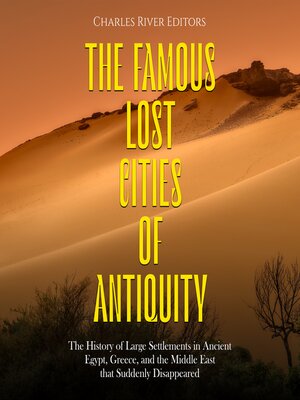The Famous Lost Cities of Antiquity
audiobook (Unabridged) ∣ The History of Large Settlements in Ancient Egypt, Greece, and the Middle East that Suddenly Disappeared
By Charles River Editors

Sign up to save your library
With an OverDrive account, you can save your favorite libraries for at-a-glance information about availability. Find out more about OverDrive accounts.
Find this title in Libby, the library reading app by OverDrive.



Search for a digital library with this title
Title found at these libraries:
| Library Name | Distance |
|---|---|
| Loading... |
Throughout the millennia since the pharaohs ruled Egypt, peasants have routinely used remnants of ancient monuments for new housing structures, implements, and even fertilizer, and the situation is even more pronounced closer to the Mediterranean coast. Cities that once were major ports where the various branches of the Nile River flowed into the Mediterranean are now miles off the coastline, under hundreds of feet of water. The existence of these cities was known thanks to Egyptian and Greek historical sources, but their locations could never be positively identified until the advent of modern marine technology. In 1996, adventurer and scholar Franck Goddio identified what he believed was a major site just off the Mediterranean coastline in the Abu Qir Bay, east of Alexandria. It turned out Goddio had discovered the ancient city of Heracleion.
If it were not for some very fortunate events and circumstances, the modern world might never have known about Mari. For a period of just under 100 years, the city of Mari in northern Mesopotamia-eastern Syria was one of the most, if not the most, important cities in the Near East. Founded by semi-nomadic Amorite tribes, Mari was gradually transformed over the span of centuries from a sleepy stop along the Euphrates River to the premier power in Near East during the early 2nd millennium BCE.
Ubar continued to fascinate people around the world, and it seemed as though its secrets would remain hidden beneath the Arabian sands until the 1980s, when a photojournalist named Nicholas Clapp eventually turned his interest into a full-time endeavor to find Ubar and put together a team of adventurers and archaeologists. Working backwards from the few scant historical and geographical accounts that portray Ubar as a prosperous city or kingdom in the centuries before Islam, Clapp narrowed their search to a location on the edge of the Arabian Desert and it is there that they believed they found Ubar







